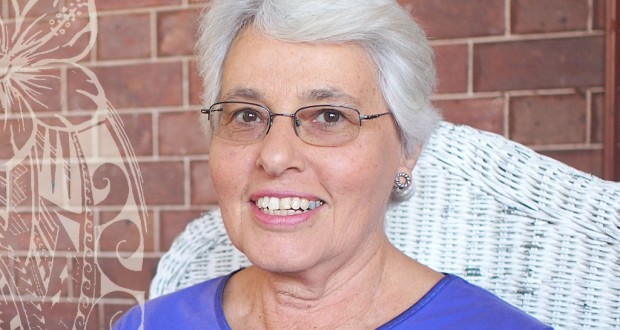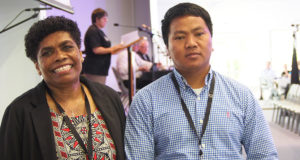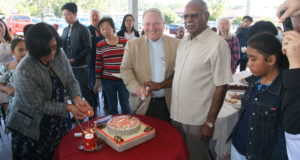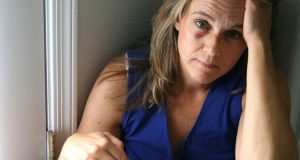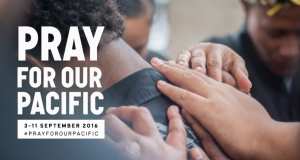Multicultural advocate Lesley Bryant talks to Dianne Jensen about her passion for building trust in fractured communities.
When Lesley Bryant first learned about her Samoan great-grandmother, it seemed like a romantic addendum to an ordinary family history. Years later, she came to understand how the legacy of Queensland’s dark history of indentured South Sea Islander labour had affected her own life and thousands of others.
Lesley is a retired microbiologist and librarian with a background in disability advocacy. She is a passionate supporter of Initiatives of Change (IofC), a world-wide movement of people committed to building peace through social cohesion, and a member of Elanora Uniting Church.
Her story begins more than 125 years ago, when her Samoan great-grandmother married a Cornishman. Their son was born in Fiji and the family emigrated to north Queensland and eventually settled in South Johnstone, a small town in the heart of the sugar estates once worked by indentured South Sea Islanders.
These were called “Kanakas”, around 50 000 labourers, mostly men, abducted or enticed primarily from the Solomon Islands and Vanuatu to provide cheap labour. Records from the State Archives reveal 15 000 deaths in Queensland over 40 years of the lucrative trade, which was cut off by the Pacific Island Labourers Act 1901. Three quarters of the 10 000 Pacific Islanders working in Australia at the time were deported.
“The White Australia Policy was to get rid of them and not have a remnant population here. Those left just had to blend in with the scenery and with the Aboriginal people,” says Lesley. “By the time my grandfather had moved to South Johnstone, there was legislation preventing the employment of Islanders in the sugar industry.”
Legacy of fear
When her grandfather died in the 1920s, leaving a young family, the enduring prejudice against Islanders forced his widow to hide her husband’s antecedents.
“Eventually my grandmother remarried and had two more children, and although my mother’s stepfather was good to her, his family were racist and so grandma didn’t keep in touch with the great-grandmother who was Samoan out of not wanting to cause trouble … so they sort of passed as Italian.”
The fear of being labelled “Kanaka” haunted Lesley’s mother who did not acknowledge her heritage until a casual conversation only a few years ago.
“Mum just couldn’t talk about it and we didn’t until my mother and father were in their eighties. I made a remark about a relative with racist views being in denial of his heritage … Mum burst into tears and said, ‘Nobody knows what racism has cost me’,” says Lesley.
“Dad realised that she thought that he didn’t know that she was coloured, and he said ‘I knew that you were coloured. Mrs So-and-so told me not to go out with you and I didn’t care’. So here they are, finally having this conversation in their eighties!”
Forgotten people
After 100 years of separation, the Initiatives of Change network helped Lesley and her mother to locate their lost family in Samoa and Fiji.
“Mum even came back and told her church ladies her true story, so I knew she’d made it,” says Lesley.
She began wondering about the Australian descendants of the “Kanakas”—now known as Australian South Sea Islanders (ASSI)—and why their story had virtually disappeared from mainstream society.
“I saw what a difference reconnecting with family had made in mum’s life, and realised that people should be able to be proud of all of their heritage, and not be shamed by any of it.
“The Initiatives of Change concept is to first look at yourself and see what needs to change, and then to engage others in change—so looking at myself and my family story and these silences made me think, I should look at the people who really are ‘Kanaka’.”
When Lesley discovered that the 150th anniversary of the arrival of the first South Sea Islanders was coming up in 2013, she saw the opportunity for healing some old divisions.
Under her leadership the ASSI 150 project was born, centred on the arrival of the first indentured labourers in August 1863 to work on the cotton plantation of Robert Towns at Townsvale (now Veresdale) near Beaudesert. The 67 workers arrived at Redbank and walked 45 km to the property.
The focus of the project was on reconciliation as well as celebrating the cultural heritage of the ASSI community living in the region. With the support of the Mununjali traditional owners, the state government, regional councils, local landowners, artists and historians, a “This is our story” commemorative walk was planned together with the Echoes exhibition in Beaudesert. Others organised 150th events and exhibitions wherever there was a sizeable ASSI community.
Creators of peace
Lesley has since been involved in the Fiji Melanesian 150th commemorations in 2014 and this year with the Australian Reflections on Blackbirding exhibition in Vanuatu.
She also works with women in Queensland and Fiji as an IofC Creators of Peace facilitator.
“The idea is that you bring women from different backgrounds into the circle where they create a safe space to hear each other’s stories … this is a way to hear the hard stuff that people are not usually game to even voice at times,” says Lesley. “This is how we learn to listen to the power of reconciliation and forgiveness.”
Building trust at home
The need to build trust between divided communities took a personal turn when conflict erupted on the Gold Coast where Lesley lives.
Like many, she was disturbed by the acrimony in her local community over an application to build a mosque in Currumbin. The application was rejected by the Gold Coast City Council in September 2014, ending up in court with no final resolution to date.
Lesley began helping local Muslim women organise chai cafés to bring women from all backgrounds together. Cafés have already been held in the Kirra community centre, Southern Cross University and Elanora Uniting Church with plans for another at Bond University.
The anger and fear generated by the issue was scary, admits Lesley, who was one of many people who copped personal flak for their involvement.
“I think that people have to get to know one another and realise that we are all in the one community. If we devalue anyone we are devaluing all of us … no one is asking us to change our beliefs or our practices, just that we leave space for others.”
Faith in action
At 69 years of age, Lesley’s faith journey reflects her life-long compassion for those who live with disability or disadvantage.
Along with working with IofC and a range of community and humanitarian organisations, Lesley spent 25 years as a volunteer with the Leprosy Mission. This work, she says, truly reflects the transformational ministry of Jesus.
“Reaching out to the outcasts who could not even be touched because they were unclean—Jesus was able to value them and heal them and restore their place in society … if compassion doesn’t rule our motivation, I can’t see that we’re following Jesus.”
While remaining firmly rooted in the Uniting Church, Lesley belongs to the Progressive Spirituality Network and openly questions some of the beliefs to which other Christians hold fast.
“Certainly I call myself a passionate follower of Jesus but some people in my church wouldn’t even call me Christian because I don’t say the creeds like I’m expected to. But I am a Christian, because I’m a follower of Jesus and I don’t know what else you are supposed to be.
“I think these days Jesus would probably preach the parable of the good Muslim, and people would be as shocked as they were when he preached the parable of the good Samaritan.”
 JourneyOnline
JourneyOnline
